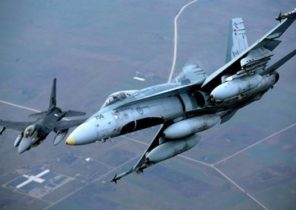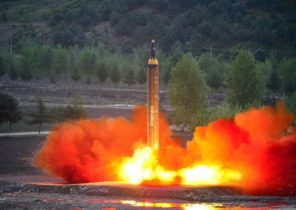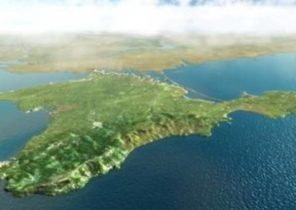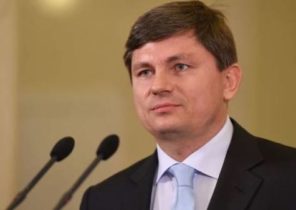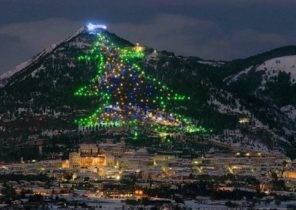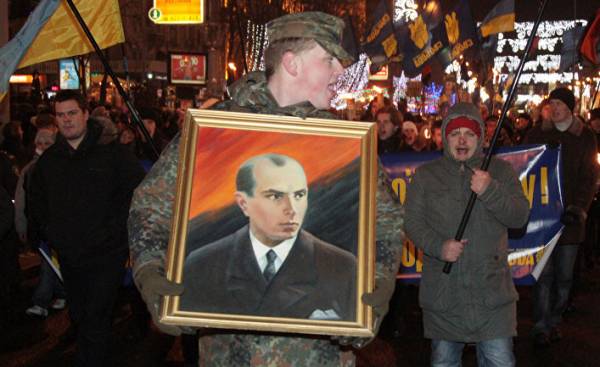
Russian historian, specialist in Russian history of the XX century, Andrei Zubov in an interview with “Apostrophe” shared his opinion about the prospect of the return of the Crimea, about “soft” and “hard” ways to terminate the war in the Donbass, why Ukraine should not raise the language issue, and is there a “cult of Bandera” in Ukraine.
“Apostrophe” In the coming days will be the third anniversary of the Russian invasion of Crimea. Caused by the annexation euphoria has not yet passed?
Andrei Zubov: Yes, I think it is largely gone. This fact is used: well, Yes, Crimea is in Russia now, “Crimea is ours” as they say. And people calmed down. Already such an acute reaction is no, but I think that if tomorrow the Peninsula again will give Ukraine very negative reaction will definitely be.
— Is there a possibility of the return of the Crimea to the Ukraine? How can this happen?
It’s difficult to say. I just know that the international community did not accept the fact of annexation of the territory, carried out absolutely at random. So I think that, in order for Russia to return to the world community and become an equal partner for other countries, not a pariah, it will have to somehow solve the problem of the Crimea. As she does, I have a hard to say. At the time I was offered one model. But, you know, you never know what offer I… Hope that everyone will forget [the occupation of Crimea by Russia], not worth it. At least in the foreseeable future nobody will forget in life Putin will not forget. Maybe 50 years from now and forget, but not now. Now Russia will have to suffer from international isolation and sanctions.
— Politicians like Khodorkovsky, Navalny, said that Crimea is not a sandwich, to give it away here and there, not a problem for the Russians…
— The return of the Crimea do not really care, because as long as Russian society does not associate the worsening of their lives with the Crimea. And in fact, of course, this relationship can be seen.
I wanted rather to ask whether such policies need to consider the return of the Crimea, if they somehow come to power?
— Understand that a politician, especially in Russia and Ukraine, said during the election campaign — it’s not what he says, when he came to power. These are completely different things. So I think that if, hypothetically, although this is very unlikely — we imagine Khodorkovsky or Navalny received the fulness of power, and they will personally face the fact that either the decision of the Crimean problem again, or the isolation of Russia, I think, most likely, they will come to what is necessary to solve the Crimean problem. Because for any policy, say, of the opposition, rise to power can be a reliable only if it will solve the economic problems of the population will improve, roughly speaking, the standard of living of the population. And this is possible only with the lifting of sanctions. So we’ll still have to solve the issue.
— Do Bulk some chance at least to participate in the presidential campaign in 2018?
— It is absolutely unpredictable things. I don’t like to guess. It all depends on the Kremlin. While the Kremlin has the power in the country, if it considers it desirable for himself to Bulk fulfill that role, you know, legitimator of Putin’s victory, or the man Putin is to deliver, then Bulk will allow you to participate in the elections. If it is harmful to something — say, to convict, even without hope to come to power, the current government in mass crimes, including corruption, is not to participate in the elections and all. You see, here the only question is the technology of the Kremlin. Unfortunately, other forces neither the Bulk nor the Russian society there.
— On the one hand Russia annexed the Crimea, and on the other is discussing with Japan the issue of joint economic activities on the Kuril Islands. How can this be explained?
The approach is very simple: Putin would not weaken their status in the Kuril Islands, if not universal insulation. He tries to break this isolation in different ways: elections trump in the US, perhaps, some weakening of the European Union after the victory of the nationalists, if it is in France. One such way is Japan. But note that Putin constantly stresses, like its promoters, the same Sands that we are not talking about the transfer of the Islands, but only the joint operation. I don’t know that actually, nobody knows, but the public refers only to the joint operation, that is, the transfer of the Islands as there are none. And the Crimea was annexed and became the subject of the Russian Federation, so that here, as they say, everything has already happened. There is no contradiction, in my opinion. This is an attempt to overcome the sanctions, to get out from under that dome, under which lies the Kremlin.
— Can there be actually a solution to the territorial dispute in the case of the Kuril Islands?
I do not know. The fact that I was serious experts at the foreign Ministry said that if to refer the matter to the international court, then 80% to win Russia. So, objectively, Japan has very few arguments in favor of the right to these Islands, and Russia quite a lot, according to the results of the Second world war. But it is difficult to say, because I’m not an expert in this Kuril issue — I only use words people who are seriously doing it.
— The Minsk agreements have stalled. Do you see ways to end the war in the Donbass?
— Of course, while the Kremlin hopes that Ukraine will not stand the pressure and go actually to the creation of Transnistria in the Donbas. But if Ukraine will resist pressure and will not do it, then the Minsk agreement is the softest form of the solution. And I think that internally the Kremlin to her more and more ready. Here the death of one after another of these, I’d say native leaders of the Donetsk separatism is a characteristic sign that the Kremlin is looking for some acceptable for the world community settlement in the Donbass. Donbass is very burdensome for Russia even more than Crimea, because there is a war ravaged the territory, it is necessary as-that to support, people to feed, a large number of refugees from Donbas and in Russia too. Therefore, in the current deteriorating economic climate, the solution to the problem of Donbass is not only a problem of isolation. The solution to the problem of Donbass will not solve the problem of isolation — the problem of the Crimea it will solve. It is the solution of great economic problems for Russia.
You said “Minsk” is a soft way to resolve the conflict. And what’s hard?
Hard way is just to leave the Donbass, period. As if to give Ukraine to solve the problem of this area completely. Actually, this is based on ideas of territorial integrity and sovereignty of the country and assumed. But the Minsk agreement, as you remember, give a number of reservations regarding the special status of the area and so on. That is a softer way when the sovereignty of Ukraine in part limited to international agreements. That’s why I say that Russia is the best. Worse, if, as they say, have to leave and forget. Then the loss of moral, political, and economic will be far greater.
— What initiatives Ukraine should take, instead of “Minsk”, it might be more effective?
I would for Ukraine recommended not to depart from Minsk agreements. Actually, all that has been done by Ukraine, is guaranteed Autonomous — but, in the naturally of Ukraine and under control of Ukrainian law enforcement agencies of the existence of this part of the Donbass in terms of culture, language and so on. I think that’s quite enough of things, and from the point of view of logic of the global community, if we are talking about what is this whole wave in the Donbas started because people didn’t want to lose the rights to Russian language — these problems will be solved. All Ukraine is necessary to emphasize that in respect of its national minorities, including Russian, she is fully prepared to comply with the European Charter [of the languages] of national minorities. To it have long been joined in the same Baltic States, where there were problems with the Russian population. And, as you know, now the problems are already big there. Therefore, Ukraine should do the same. Especially since she plans to join the EU. And this will largely contribute to the good-looking face of Ukraine in the eyes of the international community.
— You probably know that recently we have a new legislative proposal in the field of language. What do you think, does Ukraine need the protection of the Ukrainian language at the state level?
— I think that such a thing as a language that can split the society very much. Of course, not in itself, but because it is inflated by some political forces. So it seems to me that these issues have long been go on European practice — that the people decide what language to teach their children. But since the state language is Ukrainian, of course, in Ukraine nobody wants to learn the Ukrainian language. The only question is the ratio of the volume of education in the language. And the use of languages other than Ukrainian, in the office in those territories where the majority of the population main language is not Ukrainian — it is perfectly normal in Finland is similarly used Swedish, Lappish language. It is generally accepted European practice. That’s what I said, Ukraine should not go against the trends of Europe in any way, because then it will lose its protector and nothing to gain but aggravation of the situation.
— Wouldn’t the omission of the language issue to the exclusion of Ukrainian, as it happened in Belarus? And now in this country there are courses of the Belarusian language.
The ultimate situation — this is Ireland, where the whole struggle for independence was because the Irish are not British. And in Ireland, almost nobody speaks the Irish language, all speak English. The same thing in Malta — the Maltese language, in General, is marginal, basically all speak English. Ukraine is not such a situation. But in principle, to fight for the language, if it does not want to talk too silly. After all, the main value — the person, not the language. Here Ireland exists, even when there speak English. Ireland never wanted to be part of England. I think in Ukraine the situation is much less dramatic than in Ireland, and a large part of the population of Ukraine speaks indeed of the Ukrainian language. Well, will speak. But any imposition, it seems to me, is a return to the XIX century. Now is not the time just.
— Ukraine on both sides — Poland and, of course, in Russia — accused of the “cult of Bandera”? Does he think really?
Elements of the revival of worship of Stepan Bandera are available, as well as all the Ukrainian liberation army (banned in Russia organization — approx. ed.). I think that this is a purely Ukrainian issue. You know, in Poland there is a cult of the founder of the state…
— Pilsudski you probably mean.
— Pilsudski, of course! There is a cult of Pilsudski, his monument stands in the main square of Warsaw. By the way, in that place stood the Orthodox Cathedral, which Pilsudski was demolished. Now, for many people in the world, including in Russia, Ukraine, Pilsudski is a odious person. Understand, this is an extreme nationalist who fought in the ranks of the German army against the Entente, and so on. But we do not say: “No, please!”. The case of the poles. In the end, for the poles Pilsudski is a national hero indeed. They think so, well, please. No crimes against humanity, mass he did not commit. But he certainly spent deukrainization Western Ukraine, when it was annexed to Poland, and Western Belarus. And that’s a fact. It was soft, not Stalinist methods, but held. And this, incidentally, provoked a reaction, which there was a movement of Ukrainian nationalists, including Bandera. Therefore, the charges against Bandera — it’s weird. Because Bandera fought with Pilsudski. And in Russia especially. Bandera fought for an independent Ukraine after 1945, when it was no Nazism, fascism was. And he said that his main enemy is the Communists. He struggled with the interior Ministry troops, he was the victim: Moscow gave the order for his destruction, he was killed in Munich under Khrushchev, like many leaders of his movement. So not Russian to specify. Russian, or rather the Communists, the KGB killed Bandera hundreds of thousands of his supporters, evicted, deported to Siberia, Kazakhstan. To indicate whether present-day Russia, where the KGB is in power that Bandera cannot be read — in my opinion, the case of Ukraine. It makes its decision. At least no one can accuse that Bandera had committed a crime against humanity is impossible. Yes he was a terrorist, Yes, he approved of terrorism. But the monuments to Lenin, and he was a thousand times more terrorist.
— If I’m not mistaken, you believe that your country would be called Great Russia, instead of Russia…
— No, I do not think so. He never even called. But when I talk about Ukraine, Belarus and Russia, for convenience I use the term “Great” to emphasize that the current Russia — only one part of the ancient Russian state. And so, when we talk about Ukraine, we also speak about the ancient Russian state, which was divided into three rather late, after the liberation from the Mongol conquest of the greater part of present-day Ukraine and Belarus today. Then gradually formed the different. So I use this term, but that doesn’t mean I’m going to propose to rename the current government. Now Ukraine called Little Russia.
But the name of little Russia you don’t find offensive?
— Of course, not offensive, of course. It is, rather, honorable. Because I just explained that all these terms — little Russia, Great Russia — appeared in Constantinople. And they make sense in the Greek context, as the metropolis and the colonial periphery. The metropolis has always been called in Greece, little Greece, and a colonial periphery — great Greece. Sicily, for example. So the Greeks, who in Byzantium always loved these historical reflexes, all the while worried themselves the ancient Greeks, and for Russia to use these concepts in ancient Greek cultural context. Hence, there was “little Russia”, “Great”, and not because little of the bad, and the great good.
